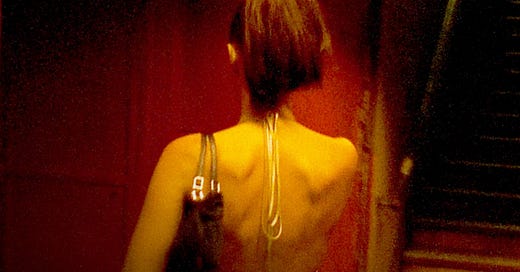Film Review: Gaspar Noe's "Irreversible" and Andrei Tarkovsky's "Stalker"
Their meaning is simple
read more of The Indo-European Friendship Club through the table of contents
Both of these films have very straightforward plots, but they seem to cause people to obfuscate when talking about them. The tendency to rule out the coherence of an atmospheric movie’s story for an unqualified nonverbal enjoyment of its audiovisual aspect is a common one. For example, many people not only deny the possibility of but actually become hostile to when the interpretation of the works of David Lynch comes into question, and with anger they say that he is a mere craftsman of the aesthetic of dreams. Of course, aesthetics is a major part of cinema, but narrative is its partner, and they work together to deliver to their recipient a reasoned account, but only if you take the trouble to put together what they necessarily suggest. To understand that relation is the task of literary criticism. To engage in literary criticism is not identical with being hopelessly trapped in words, in logocentrism.
Summary assessment: I think Irreversible is a mediocre movie, but Stalker is a masterpiece, one of the gorgeous pinnacles of cinematic art.
IRREVERSIBLE EXPLAINED: Monica Belluci is Europe; Pierre is the inhibited but real men of Europe; Le Tenia is the dysgenic result of those inhibition of civilization or its refuse; Marcus is fake-uninhibited male i.e. playacting i.e. “gay” men of Europe. As he is exuberant in a defanged way—or a safe danger that appeals to women who feel that they have nothing left to do but have fun, as when European Civilization feels itself to be taskless—Marcus gets to be the lover of Monica Bellucci, but he gets beaten up when he encounters real danger: therefore the judgment on him is that he can play but cannot fight.
When Marcus is violated Pierre rises to the occasion and kills: but Pierre was sexually rejected by Monica Bellucci exactly because he, unlike Marcus, is not a playful but a serious man: he is genuinely capable of violence. So the judgment on Pierre is that he can fight but is not wanted. He even gets arrested. Le Tenia is the remnant and reminder that inhibiting civilization (as when American and Soviet Communism occupied Europe and disarmed it) does not result in safety and prosperty for all but horrible dysgenics with horrible consequences.
So we have dygenics destroying beautiful Europe because among the normal healthy men those who can engage in fertile coitus have been seperated from those who can fight, whereas good results arise when the same person is raised and cultured to do both.
Speaking of children—
STALKER EXPLAINED: it is a basic criticism of communism. Yes, it really is that simple, if you just listen to the words of the characters: the ruling class of the Soviet Union are demoralized (literally de-moral-ized, their morals have been taken away), so much so that given the ability to do anything, not only they will not rule the world or emancipate the proleteriat or whatever, but they will not even take private revenge, or be satisfied with personal success! This upsets the Stalker, who is just a homo sovieticus, proud of his skill in navigating the dangers of the Zone, bitter about his time in prison. So the human material they rule over, although they’ve been harsh to it, is shown to be good enough to deliver them to their destination, but the ruling class do not believe in their own title, and so are rudderless.
The insecurity and ritualistic deference with which the Stalker moves them through the Zone, is a metaphor for the consequence of social terrorism which made public existence irrational and insecure. It will suffice to remember things like quotas for the Gulag. The incinerated and rusted things of civilization in beautiful nature of the Zone is likewise the image of bolshevik rule making a terrible wreckage out of the great Russian society they terrorized.
But why at the end does the child possess telekinesis? Because humanity, no matter how injured, renews itself through regeneration. Children can do, as if by magic, what they always have the potential of, which is to reset even the severest dysfunction, and improve life, though their parents suffered terribly, although there is no guarantee.
But, above all, may they believe in themselves and become as helpless as children. For softness is great and strength is worthless. When a man is born, he is soft and pliable. When he dies, he is strong and hard. When a tree grows, it is soft and pliable. But when it's dry and hard, it dies. Hardness and strength are death's companions. Flexibility and softness are the embodiment of life. That which has become hard shall not triumph.





